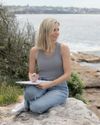
For several months, Natalie F Kyriacou woke up in stifling heat and humidity each day. She was living in a small guest house backing onto one of the few remaining tracks of protected rainforest in Sabah, Malaysian Borneo.
A journalism student at the time, Kyriacou travelled to the Bornean jungle to work on an orangutan rehabilitation project, hoping to learn more about the challenges facing some of the world's most iconic species and to write about the impact palm oil was having on wildlife in the region.
Each day, she bottle-fed infant orangutans, sourced food and enrichment for local wildlife, taught juvenile orangutans to climb trees, and monitored wild nest populations, all while wrapping up the final semester of her university degree. It was a life-changing experience, but not one Kyriacou necessarily recommends today.
While she feels very fortunate to have had such a unique experience, she believes handling wildlife isn't something anybody should strive towards. "It's an indicator that we, as humanity, have meddled too much," she says. "There is nothing more beautiful than hearing and witnessing truly wild wildlife thriving in their natural habitats, without human interference."
It's a belief that stems from Kyriacou's experience in Borneo. She remembers the bittersweet moment when she was standing on the edge of the jungle talking to a local ranger when something grasped her hand. It was a young orangutan gazing up, gently holding onto her. "While I selfishly cherished the experience, I also knew that this was not the behaviour of a healthy, thriving, and wild orangutan," Kyriacou says. "This orangutan was quite thin and was, uncharacteristically and unnaturally, standing on his two hind legs like a human."
This story is from the WellBeing #198 edition of WellBeing.
Start your 7-day Magzter GOLD free trial to access thousands of curated premium stories, and 9,000+ magazines and newspapers.
Already a subscriber ? Sign In
This story is from the WellBeing #198 edition of WellBeing.
Start your 7-day Magzter GOLD free trial to access thousands of curated premium stories, and 9,000+ magazines and newspapers.
Already a subscriber? Sign In

YOGA FOR IMPERFECTION
Life is messy and we all make mistakes, but by embracing imperfection, we can begin to accept all parts of ourselves.

Creating the foundations of ritualist self-care
As a busy mum of a three-year-old and expecting another baby, finding time for self-care often feels like a luxury.

Are you doom spending?
If \"doom spending\" has become your go-to for coping with stress, you could be making withdrawals from not just your bank account, but your health too.

THE POWER OF music
Most of us enjoy music. But science shows music is central to being human and its effect on us is far more astonishing and impactful than we realise. Music is fundamental to life.

SYNTHETIC FOODS
Synthetic, or genetically modified, fake meats and the like attempt to mimic real meat in both looks, taste and texture. But how much do we really know about the production process and how do they affect the environment and our bodies?

Embracing the power of nature
Menopause is more than just a biological change, it represents a significant life stage that can present numerous challenges - from hot flushes and mood swings to fatigue and sleepless nights.

Jan Fran
From a young age, Jan Fran's deep curiosity and keen interest in social issues sparked her journey into the world of journalism. As an accomplished journalist, media commentator and broadcaster, Fran's passion for storytelling has always been driven by a desire to explore, question and shed light on the world around her.

Helping teen girls thrive
Statistics reveal that many more teen girls are struggling with mental health issues. What's going on with them? More importantly, what can we do to help them flourish?

Your ageing eyes
Your eyes work hard for you every waking minute. It is no surprise that how your eyes age will be determined by how you protect them. Eating the right foods can go along way towards ensuring that your eyes stay healthy for a lifetime.

The bottom line
During the Couid pandemic, we were shocked to see people fighting in supermarkets over toilet paper and to see empty shelves that had once held roll after roll. The reasons behind the run for toilet paper during this time reflect the unique place that it holds in our psyche and are deeply rooted in our history.